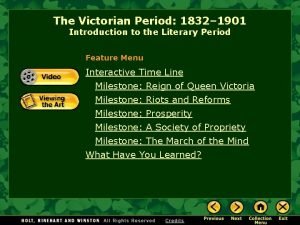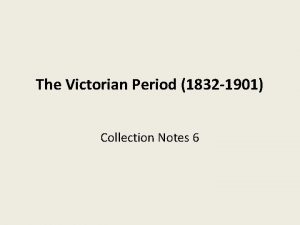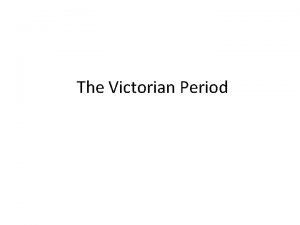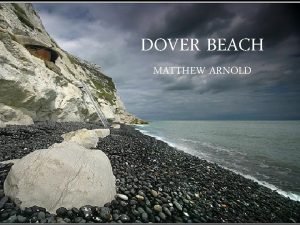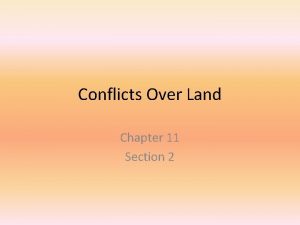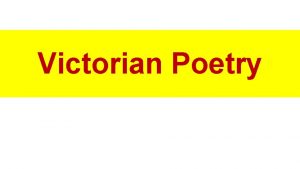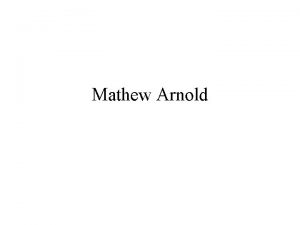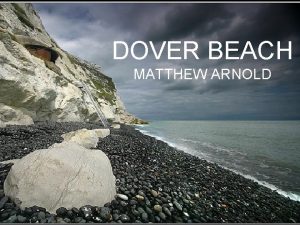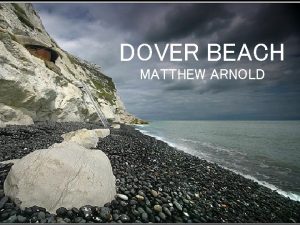Victorian Poetry Mathew Arnold Victorian Poetry 1832 1901








- Slides: 8

Victorian Poetry Mathew Arnold

Victorian Poetry 1832 -1901 Victorian era is the historical period of Queen Victoria’s reign from 1837 -1901. Victorian era witnessed a set of substantial historical, cultural, and social changes which influenced the viewpoints of Victorian people on the whole world, religion, and life itself. Some of these changes were: • Technological progress and industrial prosperity • The Rise of England as a Great Empire which controlled more than half of the world. The era when the sun never set on the Great British Empire. • Deteriorating role of religion resulted from conflict between religion and science (skeptical mentality) • Poverty, misery, tyranny, and abuse of man and wealth. Nevertheless, the upper classes of Britain felt their society was the epitome of prosperity, progress, and virtue.

Victorian Period 1832 -1901 Victorian era is a time of contrasts and conflicts. Charles Dickens described this age as “It was the best of times, it was the worst of times…” Major Conflicts Conflict of Morality Ø London and other British cities had countless gaming halls which provided venues not just for gambling but also opium dens and prostitution. Is it moral? Ø Upper-class people doubled their wealth at the expense of desperate working class and the breach between the two enormously expanded. Is it moral? ! Conflict over Technology and Industry Ø The technological advances relegated the position of man and it was only good for the upper-class people who exploited the need of the working class to increase their wealth. Ø Working conditions in factories were deplorable. With no safety regulations and no laws limiting either the number of hours people could be required to work or the age of factory workers. Some factory owners were willing to sacrifice the well-being of their employees for greater profit. Children as young as five worked in factories and mines.

Victorian Period 1832 -1901 Conflict over Faith and Religion Ø In 1859, Charles Darwin published his book “On the Origin of Species” in which he claimed that humankind descended from apes, and hereby he denied the existence of a divine being that controls the world and cares for all creatures, among which human beings. Ø Also, lack of concern for appalling human conditions among the lower classes, led some to doubt the presence of a divine being in the world and others to question the value of Christianity. Ø The majority of people reconsidered religion and many were dissuaded from the Christian doctrine

Victorian Period 1832 -1901 Ø Ø Ø Conflicts over Imperialism A desire to expand industrial wealth and to have access to inexpensive raw materials led to the British occupation of countries around the globe. Along with their desire for material gains, many British saw the expansion of the British Empire as what Rudyard Kipling referred to as, “the white man’s burden”. it is the responsibility of the British to bring their civilization and their way of life to what many considered inferior cultures. The result of this type of reasoning was often the destruction of local cultures and the oppression of local populations. Also, British people sustained severe losses, bloodshed, massacres, and atrocities. So, many questioned all this bloodshed is for why!!! Other conflicts: Women’s Rights

Characteristics of Victorian Poetry ü The romanticized version of life was superseded with another version of realism and naturalism. ü Sensory language, replete with imagery appealing to the five senses, to convey the growing conflict between religion an science, and to depict the appalling conditions of humans. ü Sentimentality and exaggerated feelings of sadness and nostalgia ü Sense of humor and comic language to indicate the contrasts and paradoxes of the time. ü References to medieval literature and mythical stories to satirize the ironic and paradoxical conditions of Great Britain ü Focus on reforming the present rather that celebrating the past for its perfectness. ü Regular and refined meter

Dover Beach: Text The sea is calm tonight. The tide is full, the moon lies fair Upon the straits; on the French coast the light Gleams and is gone; the cliffs of England stand, Glimmering and vast, out in the tranquil bay. Come to the window, sweet is the night-air! Only, from the long line of spray Where the sea meets the moon-blanched land, Listen! you hear the grating roar Of pebbles which the waves draw back, and fling, At their return, up the high strand, Begin, and cease, and then again begin, With tremulous cadence slow, and bring The eternal note of sadness in. Sophocles long ago Heard it on the Ægean, and it brought Into his mind the turbid ebb and flow Of human misery; we Find also in the sound a thought, Hearing it by this distant northern sea. The Sea of Faith Was once, too, at the full, and round earth’s sho Lay like the folds of a bright girdle furled. But now I only hear Its melancholy, long, withdrawing roar, Retreating, to the breath Of the night-wind, down the vast edges drear And naked shingles of the world.

Dover Beach: Text Ah, love, let us be true To one another! for the world, which seems To lie before us like a land of dreams, So various, so beautiful, so new, Hath really neither joy, nor love, nor light, Nor certitude, nor peace, nor help for pain; And we are here as on a darkling plain Swept with confused alarms of struggle and flight, Where ignorant armies clash by night.
